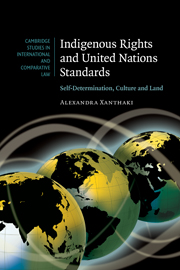Book contents
- Frontmatter
- Contents
- Table of cases
- Table of statutes
- Acknowledgments
- Introduction
- 1 Recognition of cultural membership and implications
- Part I United Nations instruments on indigenous peoples
- Part II Thematic analysis
- Conclusions
- Bibliography
- Index
- CAMBRIDGE STUDIES IN INTERNATIONAL AND COMPARATIVE LAW
Conclusions
Published online by Cambridge University Press: 25 July 2009
- Frontmatter
- Contents
- Table of cases
- Table of statutes
- Acknowledgments
- Introduction
- 1 Recognition of cultural membership and implications
- Part I United Nations instruments on indigenous peoples
- Part II Thematic analysis
- Conclusions
- Bibliography
- Index
- CAMBRIDGE STUDIES IN INTERNATIONAL AND COMPARATIVE LAW
Summary
Existing norms of international law build a framework that favours the preservation of indigenous collective identity, the underlying basis of all indigenous claims. International law standards are gradually moving away from the dichotomy between the state and the individual and endorse the multiple loyalties individuals have. The variety of cultures is celebrated and sub-national groups are perceived as part of ‘a heterogeneous public’, rather than merely ‘the other’; groups are given control and the means to contribute as equals in the evolution of the national society. Multiple loyalties act as concentric circles around the individual and allow for the re-evaluation and ultimately the evolution of cultures. In this picture, indigenous claims for collective rights and control over their affairs can be accommodated. Recognition of indigenous collective rights bestows respect for indigenous identities and allows indigenous peoples to claim back the control over matters that affect them.
The international community has recently accepted the need for specific instruments to protect indigenous rights; ILO Conventions Nos. 107 and 169 address some of the claims of these peoples. Notwithstanding its integrationist and paternalistic character, ILO Convention No. 107 recognised basic indigenous rights whose violations were pertinent at the time of its adoption and forced states parties to take systematic and coordinated action for the protection of indigenous peoples. Major contributions of ILO No. 107 were also the establishment of special measures and the inclusion of land rights.
- Type
- Chapter
- Information
- Indigenous Rights and United Nations StandardsSelf-Determination, Culture and Land, pp. 280 - 285Publisher: Cambridge University PressPrint publication year: 2007



